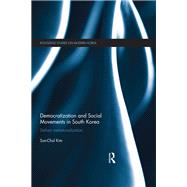- ISBN: 9780415582582 | 041558258X
- Cover: Hardcover
- Copyright: 2/4/2016
This book examines how social movements in previously authoritarian contexts evolve after a democratic transition. It looks into how democratic change shapes the trajectory of social movements, and how social movements affect the pace and direction of democracy in turn, using South Korea as a case. South Korea provides an intellectual challenge to students of social movements and democracy in that intense mobilization and a strong influence of social movements have accompanied steady democratization for more than two decades, despite major theories having predicted otherwise. The examination of how social movements and democratization interact in post-transition South Korea, therefore, aims at specifying the causal conditions and processes that contribute to our understanding of how variations occur in the trajectories of contentious politics in new democracies. Drawing on a wide range of data, including original protest event data, this book explains how South Korean social movements were able to attain strong political influence and settle as a powerful player in democratic South Korea by focusing on four causal factors: the configuration of major political actors during the transition period, the relational dynamics among social movement groups, the relationship between social movements and institutionalized political actors, and the impact of transnational forces in the post-transition period. The findings point to an uncharted trajectory of contentious democratization, in which a highly mobilized social movement sector has contributed to democratic deepening by filling in the voids created by the deficiencies in the formal political process.






